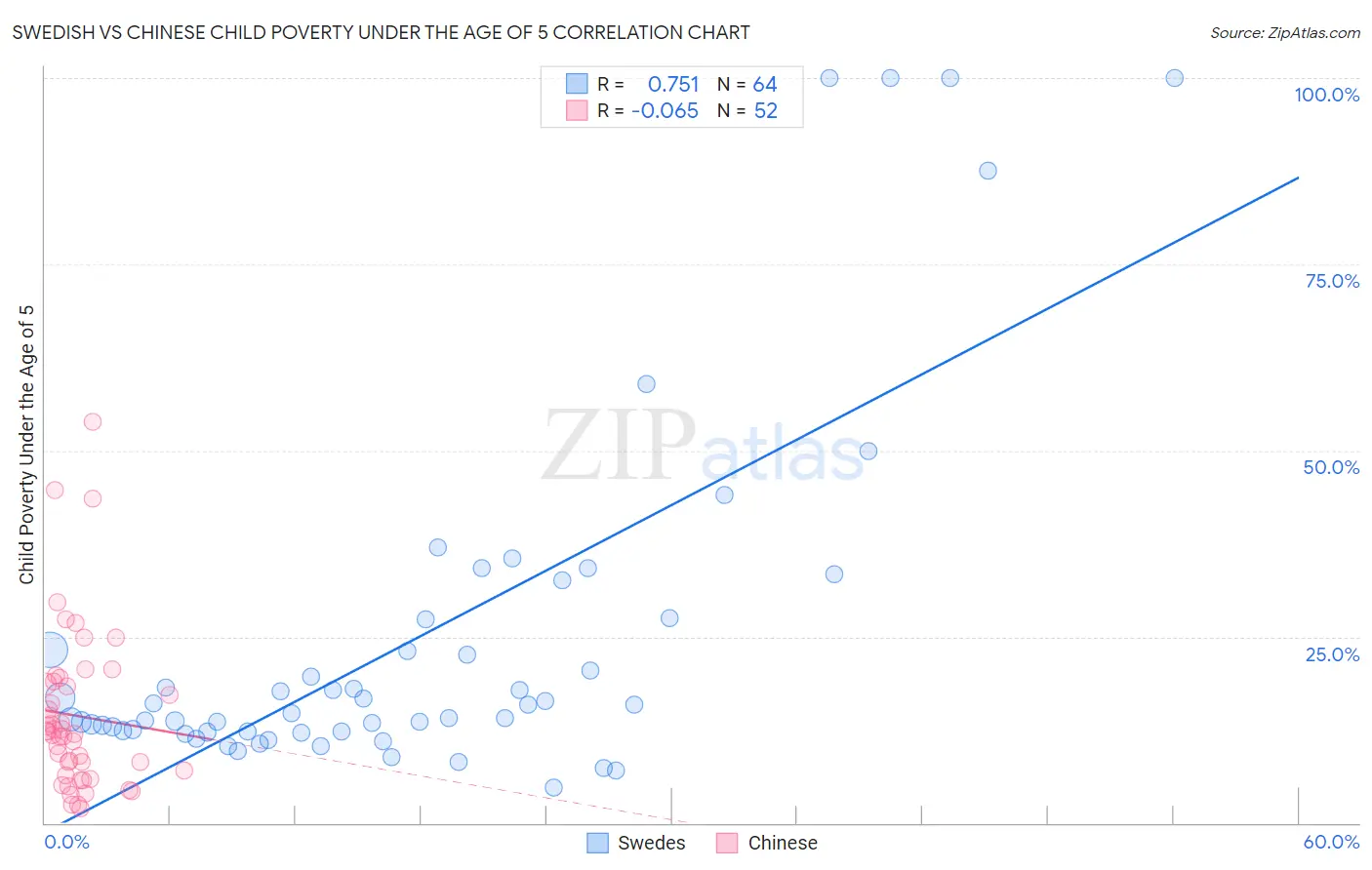Swedish vs Chinese Child Poverty Under the Age of 5
COMPARE
Swedish
Chinese
Child Poverty Under the Age of 5
Child Poverty Under the Age of 5 Comparison
Swedes
Chinese
15.0%
CHILD POVERTY UNDER THE AGE OF 5
99.4/ 100
METRIC RATING
58th/ 347
METRIC RANK
13.1%
CHILD POVERTY UNDER THE AGE OF 5
100.0/ 100
METRIC RATING
7th/ 347
METRIC RANK
Swedish vs Chinese Child Poverty Under the Age of 5 Correlation Chart
The statistical analysis conducted on geographies consisting of 502,877,472 people shows a strong positive correlation between the proportion of Swedes and poverty level among children under the age of 5 in the United States with a correlation coefficient (R) of 0.751 and weighted average of 15.0%. Similarly, the statistical analysis conducted on geographies consisting of 64,186,861 people shows a slight negative correlation between the proportion of Chinese and poverty level among children under the age of 5 in the United States with a correlation coefficient (R) of -0.065 and weighted average of 13.1%, a difference of 14.5%.

Child Poverty Under the Age of 5 Correlation Summary
| Measurement | Swedish | Chinese |
| Minimum | 4.8% | 1.9% |
| Maximum | 100.0% | 53.8% |
| Range | 95.2% | 52.0% |
| Mean | 24.6% | 14.4% |
| Median | 15.2% | 12.1% |
| Interquartile 25% (IQ1) | 12.3% | 6.7% |
| Interquartile 75% (IQ3) | 25.3% | 18.8% |
| Interquartile Range (IQR) | 13.0% | 12.1% |
| Standard Deviation (Sample) | 23.8% | 10.8% |
| Standard Deviation (Population) | 23.6% | 10.7% |
Similar Demographics by Child Poverty Under the Age of 5
Demographics Similar to Swedes by Child Poverty Under the Age of 5
In terms of child poverty under the age of 5, the demographic groups most similar to Swedes are Egyptian (14.9%, a difference of 0.050%), Immigrants from Pakistan (14.9%, a difference of 0.13%), Paraguayan (15.0%, a difference of 0.15%), Danish (14.9%, a difference of 0.20%), and Immigrants from Russia (15.0%, a difference of 0.24%).
| Demographics | Rating | Rank | Child Poverty Under the Age of 5 |
| Estonians | 99.6 /100 | #51 | Exceptional 14.8% |
| Immigrants | Serbia | 99.5 /100 | #52 | Exceptional 14.9% |
| Luxembourgers | 99.4 /100 | #53 | Exceptional 14.9% |
| Immigrants | Israel | 99.4 /100 | #54 | Exceptional 14.9% |
| Danes | 99.4 /100 | #55 | Exceptional 14.9% |
| Immigrants | Pakistan | 99.4 /100 | #56 | Exceptional 14.9% |
| Egyptians | 99.4 /100 | #57 | Exceptional 14.9% |
| Swedes | 99.4 /100 | #58 | Exceptional 15.0% |
| Paraguayans | 99.4 /100 | #59 | Exceptional 15.0% |
| Immigrants | Russia | 99.3 /100 | #60 | Exceptional 15.0% |
| Immigrants | Poland | 99.1 /100 | #61 | Exceptional 15.1% |
| Immigrants | Eastern Europe | 99.1 /100 | #62 | Exceptional 15.1% |
| Immigrants | Europe | 99.1 /100 | #63 | Exceptional 15.1% |
| Immigrants | Romania | 99.1 /100 | #64 | Exceptional 15.2% |
| Immigrants | Fiji | 99.0 /100 | #65 | Exceptional 15.2% |
Demographics Similar to Chinese by Child Poverty Under the Age of 5
In terms of child poverty under the age of 5, the demographic groups most similar to Chinese are Iranian (13.1%, a difference of 0.020%), Immigrants from Iran (13.1%, a difference of 0.17%), Immigrants from Singapore (12.9%, a difference of 0.98%), Burmese (13.2%, a difference of 1.3%), and Immigrants from Korea (13.2%, a difference of 1.4%).
| Demographics | Rating | Rank | Child Poverty Under the Age of 5 |
| Immigrants | India | 100.0 /100 | #1 | Exceptional 11.5% |
| Immigrants | Taiwan | 100.0 /100 | #2 | Exceptional 11.6% |
| Filipinos | 100.0 /100 | #3 | Exceptional 11.6% |
| Thais | 100.0 /100 | #4 | Exceptional 12.3% |
| Immigrants | Hong Kong | 100.0 /100 | #5 | Exceptional 12.4% |
| Immigrants | Singapore | 100.0 /100 | #6 | Exceptional 12.9% |
| Chinese | 100.0 /100 | #7 | Exceptional 13.1% |
| Iranians | 100.0 /100 | #8 | Exceptional 13.1% |
| Immigrants | Iran | 100.0 /100 | #9 | Exceptional 13.1% |
| Burmese | 100.0 /100 | #10 | Exceptional 13.2% |
| Immigrants | Korea | 100.0 /100 | #11 | Exceptional 13.2% |
| Immigrants | South Central Asia | 100.0 /100 | #12 | Exceptional 13.3% |
| Bhutanese | 100.0 /100 | #13 | Exceptional 13.4% |
| Okinawans | 100.0 /100 | #14 | Exceptional 13.4% |
| Indians (Asian) | 100.0 /100 | #15 | Exceptional 13.4% |